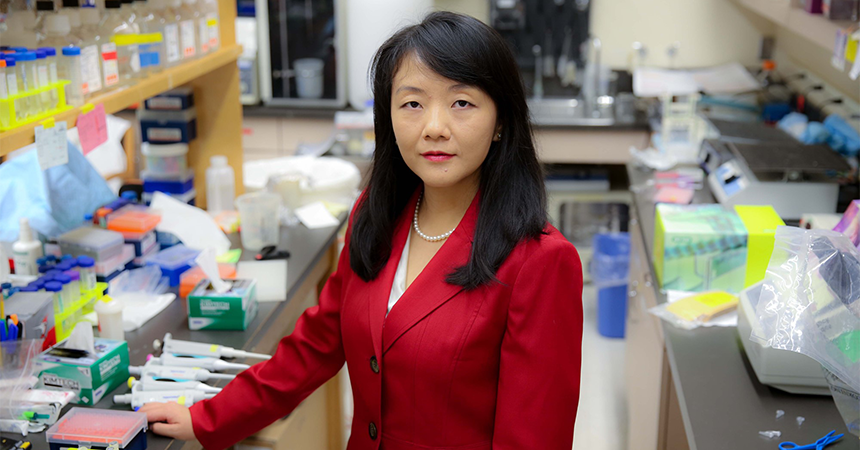HSC researcher sees potential for retinal protection with new research grant
A large number of veterans and military members experience eye trauma and potential vision loss due to service-related injuries. With the support of a research grant from the Department of Defense (DoD), researcher Dr. Hongli Wu is on the cusp of developing a delivery agent to protect those ailments.
The Vision Research Program (VRP) Investigator-Initiated Research Award is a highly competitive grant with a defined vision – “Transform visual system trauma care for our armed forces and the nation.”
According to the DoD, eye injury accounts for approximately 15 percent of all injuries from battlefield trauma sustained during the wars in Afghanistan and Iraq. Additionally, Department of Veterans Affairs’ research shows that as many as 75 percent of service members who suffered a traumatic brain injury (TBI) have visual dysfunction.
“The objective of this project is to help these visually impaired veterans by identifying an effective, safe and site-specific delivery agent that can stop vision loss,” said Dr. Wu, Associate Professor of Pharmaceutical Sciences at HSC College of Pharmacy and North Texas Eye Research Institute.
The retina is a thin layer of light-sensing tissue that is located in the back of the eye.
“The healthy retina gives us the sense of vision, allowing us to see the surrounding world and people we love,” she said. “Retinal injury due to strong light exposure, such as laser, nuclear explosion, and fire during military duties, often results in serious vision damage to soldiers.
“In spite of intense research, there is currently no effective therapy to prevent vision loss once retinal damage has begun in the back of the eye,” she added.
Dr. Wu is collaborating on this research with Dr. Katalin Prokai-Tatrai, Professor in the Department of Pharmacology and Neuroscience, and credits Dr. Prokai-Tatrai with providing the original scientific idea, strong scientific support, and academic mentoring that helped her receive this funding.
Together they have developed a smart estrogen, called DHED, which may provide a safe and effective delivery agent to protect the retina from injury.
“Other than the well-known function of estrogen as a sex hormone, estrogen exhibits strong neuroprotective effects, including within the retina,” Dr. Wu said.
Studies have shown that estrogen can protect the retina from bright, light-induced retinal damage; however, there are side effects, such as increased risk of cancer and blood clots. Therefore, developing an estrogen therapy that can be directly targeted at the retina is crucial to treatment.
DHED offers several advantages in that it does not have cancer-promoting effects, does not affect male function, and is more effective in protecting the brain and retina.
“Our objective of the present study is two-fold,” Dr. Wu said. “We will test the effects of DHED in protecting light-induced retinal damage. Additionally, we will confirm that DHED protects the retina without affecting the rest of the body, such as the heart, liver, and kidney.”
“Our project has the potential not only to advance the field of vision research, but also to change how neurodegenerative diseases can be treated,” Dr. Wu said. “The ultimate goal of this translational research is to improve human health, an outcome that benefits both the military and the rest of society.”
She added this project will also offer cutting-edge, drug discovery research experience for pharmacy students and graduate students at HSC. Third-year pharmacy students, Myhoa Tran and My-Lien Au, have already gained a heavy dose of experience, generating preliminary data and helping with the grant writing and submission process.
“One of the goals of the HSC College of Pharmacy is to ‘make healthcare better’ through the development of new therapies for the treatment of disease, especially in areas where treatment options are nonexistent or insufficient,” said Dr. Kyle Emmitte, Professor and Chair of Pharmaceutical Sciences. “The research that will be conducted by Drs. Wu and Prokai-Tatrai with the support of the Department of Defense is a great example of how HSC faculty are meeting this challenge.”
As one of 11 teams awarded this grant, Dr. Wu will receive $376,000 over two years to support her research. Dr. Wu received a pharmacy degree from Xinjiang Medical University and a Ph.D. in Pharmacology from Peking University.






Social media